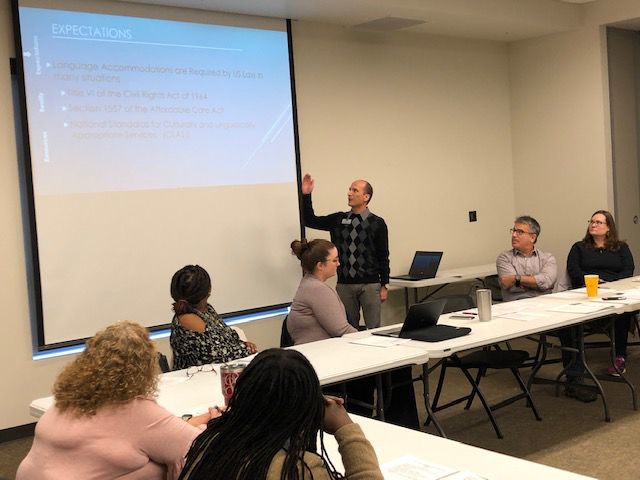Immigrants, refugees often encounter barriers to health, social services
Published 7:00 am Wednesday, December 4, 2019

- Heath Ray (standing) of Community Action of Southern Kentucky speaks Tuesday during a meeting of the Community Partnership for Immigrant and Refugee Families in Bowling Green.
A decade ago, when Heath Ray of Community Action of Southern Kentucky began working to tackle a lack of interpretive services for local immigrants and refugees, he found that many would go to the emergency room for any ailment.
“When I drilled down to figure out why that was … they said, ‘I know I can get an interpreter if I go to the ER,’ ” said Ray, who coordinates Community Action’s refugee program and the nonprofit’s 40-hour medical interpreting course.
Since then, Bowling Green has come a long way.
Medical care providers are using phone-facilitated interpretive services more frequently – aided in part by Kentucky’s Medicaid expansion, which offers cost reimbursement. For anyone accessing city government services, Bowling Green has implemented a language access plan that makes interpretive services available upon request.
Still, in other ways, Bowling Green has much work to do.
When it comes to accessing community services, Ray said, those with limited English proficiency are often turned away or told to bring their own interpreters – even in opposition to federal anti-discrimination law.
On Tuesday, speaking at the Warren County Public Library’s Bob Kirby Branch to a group of local stakeholders known as the Community Partnership for Immigrant and Refugee Families, Ray described the lack of understanding he’s seen around language accommodations.
During his presentation, Ray shared a comical conversation he had with an employee at a local facility, who told him the facility did not offer interpretive services and required those who needed them to obtain their own.
“I said, ‘Well, that’s considered discrimination if you treat them differently based on language,’ and she goes, ‘Oh no, honey … we don’t discriminate. We don’t provide interpreters for anybody,’ ” Ray said, drawing laughs from those in the room.
Language accommodations are required by federal law in many instances, perhaps the most obvious of which is the Civil Rights Act, which prohibits discrimination on the basis of national origin, a status that’s often tied to language.
Additionally, Ray said, for organizations that accept federal funding or offer medical services, there’s a requirement to provide a “qualified interpreter.”
That requirement can be met with in-person interpreters, trained bilingual staff members or phone- or video-based services, but a staffer simply being bilingual does not fulfill the requirement, Ray said. Interpreters must prove they are both proficient in their language and trained in interpreting, he said.
A big part of the problem, Ray said, is a lack of trained interpreters in the community.
Another aspect is that while the federal government considers interpretive services as a basic operating cost akin to an electric or water bill, many local organizations don’t factor it into their budgets. Outside services can be costly, ranging anywhere from $20 to $40 an hour, Ray said. Often, children are asked to step in and act as interpreters for their parents, which draws them into adults issues unnecessarily.
In other instances, language accommodations are available but not easily accessible. Ray cited an experience he had with an individual who was asked to reschedule their doctor’s appointment three times because they did not have someone with them to interpret.
“After the third time, I went there with them to interpret, and I realized that there were interpreter services available, but because he didn’t speak English he couldn’t request them,” Ray said. As a consequence, “he kept getting turned away,” Ray said.
For the Community Partnership for Immigrant and Refugee Families, Tuesday’s meeting was an opportunity to spotlight a shared problem. The group reconvened in May after a hiatus that spanned several years. Looking ahead to 2020, it’s planning to form several subcommittees that will tackle issues in different areas, including education.
Ray used the meeting to offer resources and answer questions from community representatives, including student support staff from both the Bowling Green Independent School District and Warren County Public Schools.
Among them was Dana Beasley-Brown, who serves on the Bowling Green City Commission and at Bowling Green Junior High School in its youth services center. While attending the meeting at the Bob Kirby Branch, she picked up some cards non-native speakers can use to notify medical providers of their legal right to interpretive services.
Beasley-Brown said she’s found the group helpful.
“Being in a community around other folks who are working with English language learners, they may be further down the road in figuring out a problem,” she said, adding they can share information and avoid pitfalls. “It’s really helpful when you’re reaching this population to be able to really help workshop together what works, what doesn’t.”





